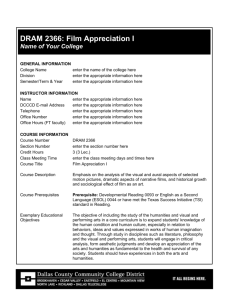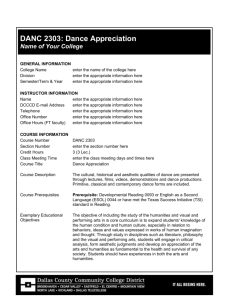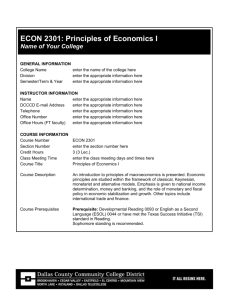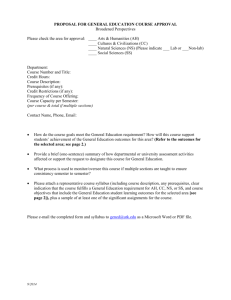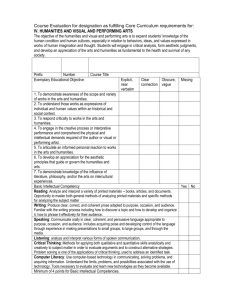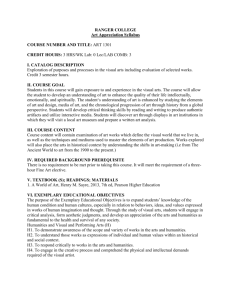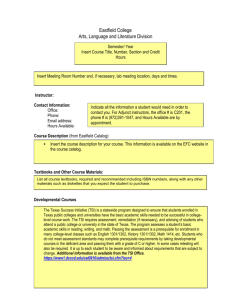MUSI 1306: Music Appreciation - Dallas County Community College
advertisement
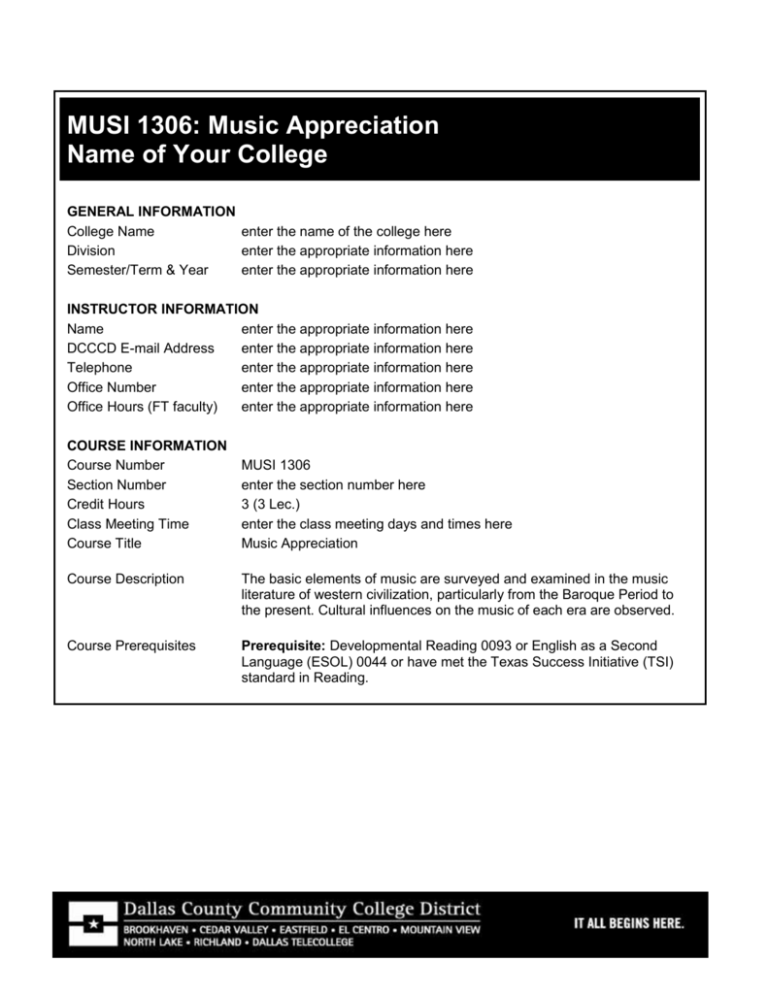
MUSI 1306: Music Appreciation Name of Your College GENERAL INFORMATION College Name enter the name of the college here Division enter the appropriate information here Semester/Term & Year enter the appropriate information here INSTRUCTOR INFORMATION Name enter the appropriate information here DCCCD E-mail Address enter the appropriate information here Telephone enter the appropriate information here Office Number enter the appropriate information here Office Hours (FT faculty) enter the appropriate information here COURSE INFORMATION Course Number Section Number Credit Hours Class Meeting Time Course Title MUSI 1306 enter the section number here 3 (3 Lec.) enter the class meeting days and times here Music Appreciation Course Description The basic elements of music are surveyed and examined in the music literature of western civilization, particularly from the Baroque Period to the present. Cultural influences on the music of each era are observed. Course Prerequisites Prerequisite: Developmental Reading 0093 or English as a Second Language (ESOL) 0044 or have met the Texas Success Initiative (TSI) standard in Reading. Exemplary Educational Objectives The objective of including the study of the humanities and visual and performing arts in a core curriculum is to expand students' knowledge of the human condition and human culture, especially in relation to behaviors, ideas and values expressed in works of human imagination and thought. Through study in disciplines such as literature, philosophy and the visual and performing arts, students will engage in critical analysis, form aesthetic judgments and develop an appreciation of the arts and humanities as fundamental to the health and survival of any society. Students should have experiences in both the arts and humanities. Exemplary Educational Objectives This course addresses all 7 of the Exemplary Educational Objectives for the Humanities/Visual and Performing Arts component area. They are: 1. To demonstrate awareness of the scope and variety of works in the arts and humanities. 2. To understand those works as expressions of individual and 3. 4. 5. 6. 7. Intellectual Competencies human values within an historical and social context. To respond critically to works in the arts and humanities. To engage in the creative process or interpretive performance and comprehend the physical and intellectual demands required of the author or visual or performing artist. To articulate an informed personal reaction to works in the arts and humanities. To develop an appreciation for the aesthetic principles that guide or govern the humanities and arts. To demonstrate knowledge of the influence of literature, philosophy and/or the arts on intercultural experiences. This course reinforces all 6 of the Core Curriculum Intellectual Competencies defined by the Texas Higher Education Coordinating Board. 1. READING: Reading at the college level means the ability to analyze and interpret a variety of printed materials--books, articles and documents. A core curriculum should offer students the opportunity to master both general methods of analyzing printed materials and specific methods for analyzing the subject matter of individual disciplines. 2. WRITING: Competency in writing is the ability to produce clear, correct and coherent prose adapted to purpose, occasion, and audience. Although correct grammar, spelling and punctuation are each a sine qua non in any composition, they do not automatically ensure that the composition itself makes sense or that the writer has much of anything to say. Students need to be familiar with the writing process including how to discover a topic and how to develop and organize it, how to phrase it effectively for their audience. These abilities can be acquired only through practice and reflection. 3. SPEAKING: Competence in speaking is the ability to communicate orally in clear, coherent and persuasive language appropriate to purpose, occasion and audience. Developing this competency includes acquiring poise and developing control of the language through experience in making presentations to small groups, to large groups and through the media. 4. LISTENING: Listening at the college level means the ability to analyze and interpret various forms of spoken communication. 5. CRITICAL THINKING: Critical thinking embraces methods of applying both qualitative and quantitative skills analytically and creatively to subject matter in order to evaluate arguments and to construct alternative strategies. Problem solving is one of the applications of critical thinking, used to address an identified task. 6. COMPUTER LITERACY: Computer Literacy at the college level means the ability to use computer-based technology in communicating, solving problems and acquiring information. Coreeducated students should have an understanding of the limits, problems and possibilities associated with the use of technology and should have the tools necessary to evaluate and learn new technologies as they become available. Specific Course Learning Outcomes enter the appropriate information here Course Outline enter the units or topics of instruction here Required or Recommended Materials enter the appropriate textbook with complete bibliographic information, manuals, equipment, etc. information here ISBN for Textbook enter the appropriate information here Evaluation Procedures enter the appropriate information here; i.e., the weighting of assignments, exams, etc. Grading Scale enter the appropriate information here; i.e., your method of calculating final grade, using points, percentages, etc. Exams and Assignments enter the number and type of exams and major assignments here Attendance Policy enter the appropriate information here INSTITUTIONAL POLICIES ADA Statement If you are a student with a disability and/or special needs who requires accommodations, please contact the college Disability Services Office. Religious Holidays Absences for observance of a religious holy day are excused. A student whose absence is excused to observe a religious holy day is allowed to take a make-up examination or complete an assignment within a reasonable time after the absence. Academic Honesty Academic honesty is expected, and integrity is valued in the Dallas County Community Colleges. Scholastic dishonesty is a violation of the Code of Student Conduct. Scholastic dishonesty includes, but is not limited to, cheating on a test, plagiarism, and collusion. As a college student, you are considered a responsible adult. Your enrollment indicates acceptance of the DCCCD Code of Student Conduct published in the DCCCD Catalog. More information is available at https://www1.dcccd.edu/catalog/ss/code.cfm. Withdrawal Policy (with drop date) If you are unable to complete this course, it is your responsibility to withdraw formally. The withdrawal request must be received in the Registrar’s Office by (semester’s drop date). Failure to do so will result in your receiving a performance grade, usually an "F." If you drop a class or withdraw from the college before the official drop/withdrawal deadline, you will receive a "W" (Withdraw) in each class dropped. STOP BEFORE YOU DROP For students who enrolled in college level courses for the first time in the fall of 2007, Texas Education Code 51.907 limits the number of courses a student may drop. You may drop no more than six courses during your entire undergraduate career unless the drop qualifies as an exception. Your campus counseling/advising center will give you more information on the allowable exceptions. Remember that once you have accumulated six non-exempt drops, you cannot drop any other courses with a “W.” Therefore, please exercise caution when dropping courses in any Texas public institution of higher learning, including all seven of the Dallas County Community Colleges. For more information, you may access: https://www1.dcccd.edu/coursedrops Repeating this Course Effective for Fall Semester 2005, the Dallas County Community Colleges will charge additional tuition to students registering the third or subsequent time for a course. This class may not be repeated for the third or subsequent time without paying the additional tuition. Third attempts include courses taken at any of the Dallas County Community Colleges since the Fall 2002 semester. More information is available at: https://www1.dcccd.edu/catalog/ss/oep/third_attempt.cfm. Financial Aid Students who are receiving any form of financial aid should check with the Financial Aid Office prior to withdrawing from classes. Withdrawals may affect your eligibility to receive further aid and could cause you to be in a position of repayment for the current semester. Students who fail to attend or participate after the drop date are also subject to this policy. Disclaimer The instructor reserves the right to amend this syllabus as necessary. CLASSROOM POLICIES Food, drink, cell phones, etiquette, etc. Optional: enter your specific classroom policies here. Remove this text if you have no policies to add.
